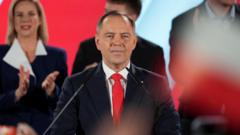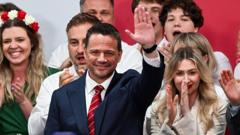As Ukrainian refugees navigate their new lives in Poland, reports of hostility and bullying are on the rise, attributed to a shift in public sentiment and a contentious political landscape.**
Rising Anti-Ukrainian Sentiment in Poland: Refugees Face Increasing Hostility**

Rising Anti-Ukrainian Sentiment in Poland: Refugees Face Increasing Hostility**
Ukrainian refugees in Poland report a worrying rise in xenophobic abuse as political tensions rise ahead of the presidential elections.**
In Poland, the burgeoning population of over 2.5 million Ukrainian refugees is now facing an unsettling reality marked by rising anti-Ukrainian sentiment. Families who once found solace in the hospitality of Polish communities are now experiencing bullying, verbal abuse, and xenophobia, particularly in schools and on public transport.
Svitlana, a Ukrainian mother, expressed her concerns as her daughter, who previously thrived in her Polish school environment, recently encountered hostility from peers who taunted her with chants like "Go back to Ukraine." This incident has become emblematic of a broader trend, as many Ukrainians report feeling unwelcome and fearful amidst escalating anti-Ukrainian rhetoric.
This change in atmosphere has coincided with a charged political climate in Poland, characterized by a divisive presidential election. The initial wave of compassion shown to Ukrainian refugees in 2022 has diminished, leading to increased public questioning of their presence, support, and contributions.
Activists are observing a troubling uptick in both online and offline abuse directed at Ukrainians. Natalia Panchenko, leading an organization that supports Ukrainian refugees, has highlighted the rise in xenophobic incidents in everyday interactions, suggesting that trauma from the ongoing war adds to the difficulties faced by vulnerable refugees.
Recent polling indicates a significant decline in Polish public support for accepting Ukrainian refugees, highlighting an increase in apprehension. Only half of the surveyed population currently favors refugee acceptance, a stark contrast to the 81% approval rate recorded two years ago.
Political actors are capitalizing on these sentiments. Candidates like Slawomir Mentzen express overtly anti-Ukrainian views, while others, like front-runner Rafal Trzaskowski, walk a fine line to navigate public opinion. Disinformation campaigns, noticeably tied to Russian propaganda, amplify negative perceptions by falsely portraying Ukrainians as exploitative or dangerous.
The consequences of this shifting landscape are profound, as ordinary Poles face the challenge of reconciling a past of support with a present marked by fear and division. Experts warn that the true impact of these sentiments will become more clear following the elections, as the full extent of anti-Ukrainian attitudes potentially influences the ballots.
Svitlana, a Ukrainian mother, expressed her concerns as her daughter, who previously thrived in her Polish school environment, recently encountered hostility from peers who taunted her with chants like "Go back to Ukraine." This incident has become emblematic of a broader trend, as many Ukrainians report feeling unwelcome and fearful amidst escalating anti-Ukrainian rhetoric.
This change in atmosphere has coincided with a charged political climate in Poland, characterized by a divisive presidential election. The initial wave of compassion shown to Ukrainian refugees in 2022 has diminished, leading to increased public questioning of their presence, support, and contributions.
Activists are observing a troubling uptick in both online and offline abuse directed at Ukrainians. Natalia Panchenko, leading an organization that supports Ukrainian refugees, has highlighted the rise in xenophobic incidents in everyday interactions, suggesting that trauma from the ongoing war adds to the difficulties faced by vulnerable refugees.
Recent polling indicates a significant decline in Polish public support for accepting Ukrainian refugees, highlighting an increase in apprehension. Only half of the surveyed population currently favors refugee acceptance, a stark contrast to the 81% approval rate recorded two years ago.
Political actors are capitalizing on these sentiments. Candidates like Slawomir Mentzen express overtly anti-Ukrainian views, while others, like front-runner Rafal Trzaskowski, walk a fine line to navigate public opinion. Disinformation campaigns, noticeably tied to Russian propaganda, amplify negative perceptions by falsely portraying Ukrainians as exploitative or dangerous.
The consequences of this shifting landscape are profound, as ordinary Poles face the challenge of reconciling a past of support with a present marked by fear and division. Experts warn that the true impact of these sentiments will become more clear following the elections, as the full extent of anti-Ukrainian attitudes potentially influences the ballots.





















